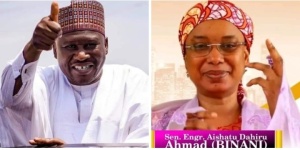In the race to finalize the ministerial list, it has emerged that President Bola Tinubu’s cabinet nominees will include at least five former governors. The list, referred to as the ‘cabinet of (political) unity,’ is set to feature individuals from the ruling All Progressives Congress (APC), the Peoples Democratic Party (PDP), and technocrats. The inclusion of nominees from different parties has sparked contests and intrigues among political camps, with considerations for suitable representatives in key states.
It is anticipated that there will be enough positions available to accommodate sought-after individuals. Sources indicate that the new cabinet is expected to consist of 42 Ministers and 20 Special Advisers. Notable changes from the previous administration include the potential elimination of Ministers of State, as well as the increased involvement of Special Advisers in the Federal Executive Council meetings.
Furthermore, the restructuring of certain ministries, such as Works and Housing, Agriculture and Rural Development, Humanitarian Affairs, Disaster Management and Social Development, and Youths and Sports, is anticipated to create more portfolios for cabinet members.
While the proposed list of nominees for Senior Special Assistants (SSAs), Special Assistants (SAs), and Personal Assistants (PAs) has been revealed, it awaits President Tinubu’s formal approval before the official announcement. Some of the nominees have reportedly already begun working in their assigned roles.
However, the state chapters and national secretariat of the APC have been sidelined in the process of recommending ministerial nominees. It appears that governors have taken charge, and in states where opposition parties hold power, party leaders have made recommendations, leading to multiple nominees in some states.
Former governors Nasir el-Rufai (Kaduna), Abdullahi Ganduje (Kano), Abubakar Atiku Bagudu (Kebbi), Muhammad Badaru Abubakar (Jigawa), and Nyesom Wike (Rivers) are among those rumored to be included in the final list. Other notable figures being considered for ministerial positions include Gbenga Daniel (Ogun), Kayode Fayemi (Ekiti), and Tokunbo Abiru (Lagos).
In Delta State, internal party factions and interests have created uncertainty regarding the selection of a ministerial candidate. The party leadership has refrained from endorsing any particular individual, leaving the field open for interested parties.
Cross River State is also witnessing speculation as various individuals, including Prof. Ben Ayade, Victor Ndoma-Egba, Dr. Betta Edu, Senator John Owan Enoh, and others, are reportedly vying for a ministerial position. However, the APC Legacy Group in the state has cautioned against appointing ministerial nominees based on political godfathers and godmothers, urging the party to reward those without such patronage.
As President Tinubu’s time for submitting the ministerial list draws closer, expectations are mounting. Notably, the list may feature individuals who have not traditionally been prominent in the South-east region or members of the APC. The President aims to promote national cohesion and unity, considering politicians and experts who can contribute to his administration’s success.
It remains to be seen which individuals will ultimately be selected for ministerial positions, but it is clear that President Tinubu is striving to strike a balance and strengthen the party’s presence in different regions of the country.
As the constitution mandates the President to submit the list within 60 days of assuming office, there is still time for the official announcement. Presidential spokesman Dele Alake emphasized that the President has the sole prerogative to appoint ministers and dismissed speculative reports, assuring the public that they will be informed when the President is ready to unveil his choices.










